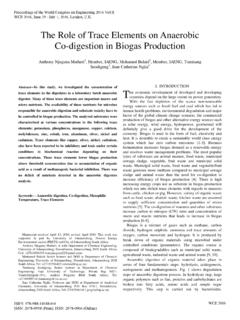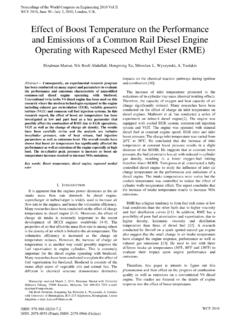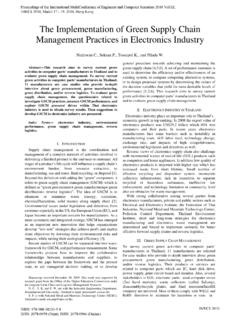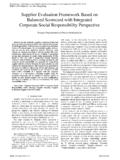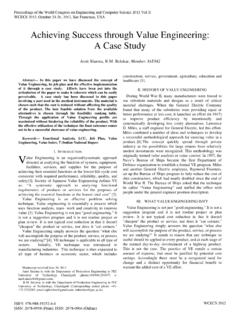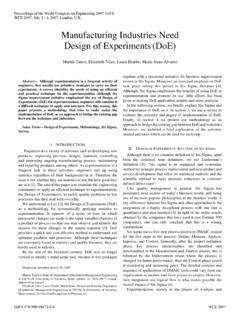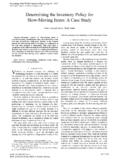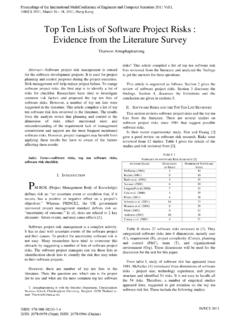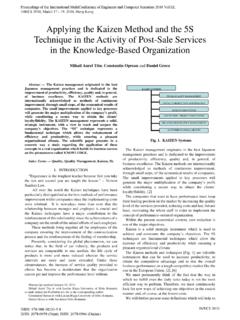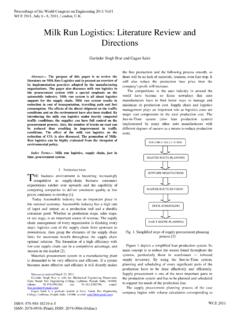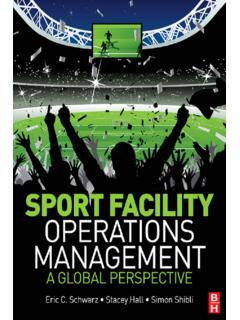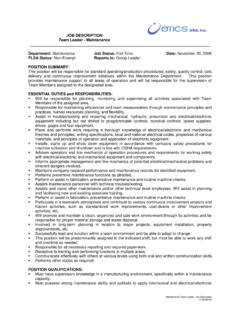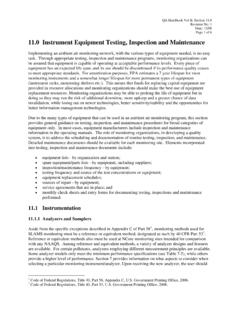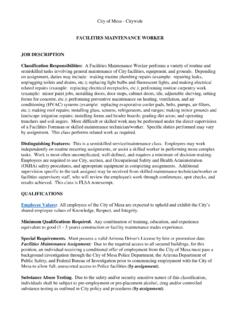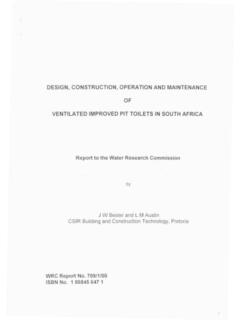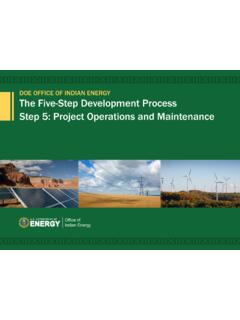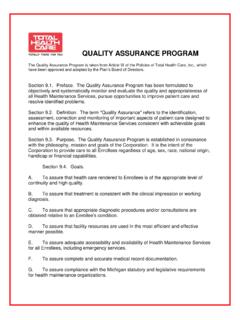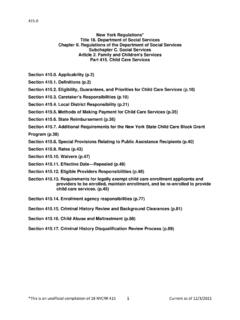Transcription of A Review of the Role of Maintenance and Facility ...
1 Abstract Facility Management (FM) is a discipline involving a variety of non-core operations and Maintenance services to support the main business of an organization. This paper aims to provide an overview on the different ways of carrying out FM and related topics, in order to uncover that there is limited research regarding the impact of FM actions on the logistics and operational performance of distribution centres and warehouses. Four different focus areas have been identified and for each one different methodologies and streams of research are studied. The analysis highlights the importance of FM for the logistics activities and underlines the need for performing research, since very few studies have explored the relationship between FM strategy, Maintenance actions and performance of logistics businesses.
2 Index Terms Facility Management, Maintenance , Logistics I. INTRODUCTION he Facility Management (FM) function has been gaining increasing recognition for the important role it can play to create cost savings and efficiency of the workplace. The primary task of FM is to manage support services to meet the needs of the organization, its core operations and employees. It deals with the Maintenance management of the physical assets and incorporates controlling services necessary for successful business [1]. As a coordinated and structured activity, FM has been being successfully applied to maintaining and operating diverse types of constructed facilities in many sectors. FM has also been being applied to industrial facilities, with an extended share in logistics and warehousing.
3 In this particular context, Maintenance plays a significant role to assure the full service of the warehousing system, which includes both building components and equipment. In its narrow meaning, Maintenance involves all activities related to maintaining a certain level of availability and reliability of a system and its components, and its ability to perform to a standard level of quality. More generally, by implementing a FM function, companies might be able not only to optimize warehouse Maintenance expenses through appropriate Maintenance , but also to contribute to effective logistic operations and higher return on investment. Manuscript received February 28, 2012; A. De Marco is with the Department of Management and Production Engineering at Politecnico di Torino; (e-mail: G.)
4 Mangano is with the Department of Management and Production Engineering at Politecnico di Torino, phone: +39011090705; (e-mail: However, many companies complain about the increasing cost of Maintenance of industrial and logistic facilities and seek to cut FM spending by reducing repair interventions to a minimum and delaying preventive Maintenance actions, which in turn lead to a cascade of extra costs in the medium and long term [2]. It seems difficult for organizations to perceive the level of FM spending as a crucial logistics business success factor and Maintenance does not receive enough management attention because of the belief that the associated costs cannot be easily controlled [3].)
5 Many studies are available to analyze diverse aspects of the FM discipline, mainly in the areas of FM strategies and actions, key performance indicators (KPI), Maintenance and operations, and contracting/outsourcing of the FM duty, and some of these works are specifically addressed to logistics and warehousing. However, little analysis has been carried out to investigate the relationship between FM and Maintenance with the performance of the logistic business. The aim of this paper is to provide a literature Review centered around the area of FM for industrial facilities and associated topics, in order to uncover that there is limited research regarding the impact that a well designed and well operated FM function can have on logistics and operational performance of warehouses.
6 The given literature Review aims at bringing out this lack of research, based on the proposition that a link between FM and business KPIs could be a promising area of unexplored business performance improvement. The objective is to suggest FM managers that they can effectively contribute to enhance business performance by designing proper FM strategies, assuring appropriate FM contract modes, and implementing effective Maintenance actions. The paper is structured as follow. First, the FM discipline has been subsumed into four main focus areas, namely Performance measurement of Facility Management , Warehouse Maintenance , Performance Measurement in Logistics Operations , and FM Contracts . For each focus area, a literature Review has been carried out in order to identify the main research streams and methodologies.
7 Then, we propose an analysis of the literature and, finally, implications and conclusions are drawn together with future research directions. A Review of the Role of Maintenance and Facility Management in Logistics Alberto De Marco, Giulio Mangano TProceedings of the World Congress on Engineering 2012 Vol III WCE 2012, July 4 - 6, 2012, London, : 978-988-19252-2-0 ISSN: 2078-0958 (Print); ISSN: 2078-0966 (Online)WCE 2012 II. PERFORMANCE MEASUREMENT OF Facility MANAGEMENT The FM discipline has emerged out of practice because of a clear need to focus on the elaborate and expensive facilities that crucially support the activities of most businesses. It is a distinctive part of the overall management function focused on the workplace. FM can be sees as an integration of three main strands of activities: property management, property operations and Maintenance , and office administration [4].
8 FM services were first provided in the 1960s in the USA and they were fully developed in 1970s. But it was only in the 1980s that such a FM market developed in Europe [5]. FM processes as well as management practices are the same all over the world, while different normative constraints have to be handled in different countries. The activities that might be carried out within FM are mainly connected to building facilities and auxiliary activities. In particular, they include building Maintenance and management, Maintenance of HVAC and energy sources, gardening, surveillance, cleaning, logistics, etc [6]. FM works at two levels; on the one hand, it provides a safe and efficient working environment, which is essential to the performance of any business.
9 On the other hand, FM can involve several strategic issues such as property portfolio management, strategic property decision, and Facility planning and development, which are related to policy and strategic planning of the organization [7]. FM should aim not only to simply reducing the operating expenses of a constructed Facility , but also to enhancing efficiency of the Facility as well [1]. To gauge the effectiveness of FM, it is necessary to reach an understanding of the current conditions of the Facility and to postulate change in FM practices in order to achieve the desired performance. As a matter of fact, FM is developing into an important corporate discipline; increasing numbers of organizations are linking their everyday business performance to their method managing their facilities and workplace assets [8].
10 The revolution of performance measurement has spread into many disciplines, including FM. Reference [9] investigates KPIs for the performance of Maintenance in healthcare facilities that are classified into four main categories: development, organization and management, performance and Maintenance efficiency. Basically, the idea is that FM must include quantitative KPIs. Thus, performance metrics is an important step in the process of performance evaluation as it includes relevant indicators that express the performance of the Facility . Therefore it is of crucial importance to identify a set of KPIs to establish effective performance evaluation metrics for the Facility under consideration [10]. KPIs are parameters that focus on critical aspects of outputs or outcomes.
